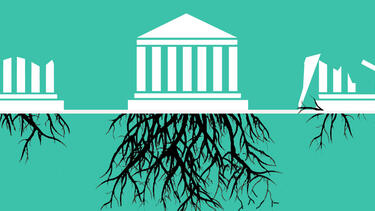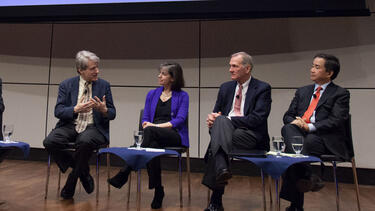Finance
The Corporation Is Centuries Older than We Thought
The genesis of the joint-stock company is usually traced to the founding of the English East India Company and the Dutch East India Company around 1600. New research co-authored by Prof. William Goetzmann says this origin story may be off by centuries.

Can We Fix the Public Pensions Crisis?
Millions of government workers in the U.S. are relying on pension plans for retirement, and yet these plans are underfunded by at least $1 trillion. Asset manager Ranji Nagaswami ’86 argues that addressing this challenge is about more than assets and liabilities—we have to look at how funds are run and, critically, how they think about risk.
How Does Your Theory of Markets Shape Your Portfolio?
Investors put financial theory into practice every day. How efficient are markets? Can market participants advantageously match their capabilities to the right investments or leverage an information advantage? A panel of asset managers discusses how they see the theories playing out in real markets.
Buying Insurance Against Climate Change
In a New York Times op-ed, Professor Robert Shiller writes that efforts to prepare for climate change should include the use of private institutions of risk management, such as insurance and securitization, to share risk and smooth the unpredictable effects of future disasters.
Can Insurance Help the Poor Manage Risk?
Rainfall insurance can help a farmer survive a drought year and ultimately increase prosperity in rural areas. So why aren’t more using it? Many people in developing countries rely on informal insurance, such as a family network, rather than formal insurance. Yale SOM professor Mushfiq Mobarak’s research has tested the effects of formal insurance for farmers in India and elucidated how the two systems interact.

What Is Factor-Based Investing?
Asset classes have long been the building blocks of investment portfolios, but when apparently uncorrelated investments moved in sync during the financial crisis, it raised fundamental questions about whether diversified portfolios actually were diversified. Eugene Podkaminer ’01, vice president of capital markets research at Callan Associates, discusses whether there is a better way to understand the deep forces driving these results.
What Does It Take to Survive on Wall Street?
Any financial institution that is going to last for decades will have to survive a crisis or two—most likely by adapting and innovating, perhaps by leaving behind chunks of its old identity. Yale Insights spoke with James Gorman, chairman and CEO of Morgan Stanley, one of two major investment banks to survive the 2008 financial crisis, about how the firm has managed to refashion itself and prepare for the future.

How Risky Is That Hedge Fund?
Hedge funds are risky. But getting beyond that bromide and evaluating the prospects of a particular fund means understanding everything from internal operations to investors’ incentives to counterparty and market conditions. David Belmont ’92, chief risk officer of Commonfund, gives a tour of the inner workings of hedge fund risk.

In Search of a Stable Electronic Currency
In a New York Times op-ed, Professor Robert J. Shiller writes that Bitcoin is a speculative bubble with a doubtful future, but its legacy should be that we move toward a system of stable economic units of measurement backed by sophisticated forms of electronic payment.
Classroom Insights: Lessons from the First Stock Bubble
Each time it happens, it seems in retrospect like people have lost their minds, and that such widespread madness could never happen again. And then it happens again. Yale SOM professor William Goetzmann looks back at an investing mania from the 18th century to better understand the forces that can create such distortions.

Can Finance Do Good?
The concluding discussion of the three-day Business + Society conference was titled “Finance in Society,” and dealt with both the tension and the possibility in that relationship.
